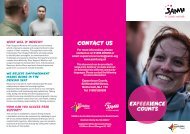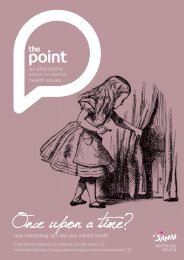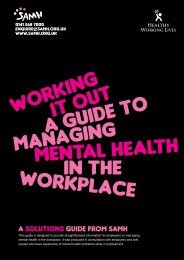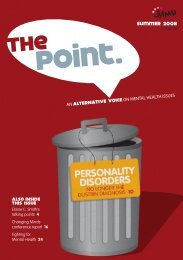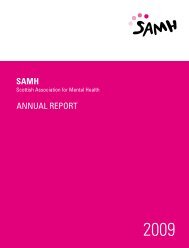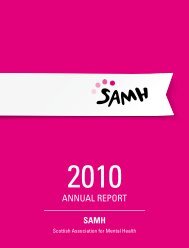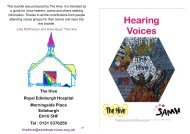CONTENTS
Untitled - Scottish Association for Mental Health
Untitled - Scottish Association for Mental Health
Create successful ePaper yourself
Turn your PDF publications into a flip-book with our unique Google optimized e-Paper software.
<strong>CONTENTS</strong><br />
Background 3<br />
Introduction by Dr Lindsay Burley 3<br />
Keynote Speakers:<br />
• Dr Bruce Ritson 4<br />
• Dr Kirsten Windfuhr 4<br />
• Nicola Sturgeon 5<br />
• Alanna Atkinson 5<br />
• Patrick Shearer 6<br />
Workshops:<br />
• Alcohol Related Brain Damage (ARBD) 7<br />
• Children and Young People 7<br />
• Dual Diagnosis 8<br />
• Education and Awareness 9<br />
Evaluation 9
BACKGROUND<br />
Alcohol related statistics certainly make for sobering reading. Industry sales data<br />
shows that enough alcohol was sold in Scotland in each of the last three years<br />
for which figures are available to enable every man and woman over 16 to<br />
exceed the sensible male weekly guideline on each and every week 1 . New<br />
research also estimates that alcohol is a contributory factor in 1 in 20 deaths in<br />
Scotland, and it is now estimated that one Scot dies every three hours as a result<br />
of alcohol misuse 2 .<br />
Less well known are the links between alcohol and mental health. People with<br />
mental health problems are at raised risk of alcohol problems and vice versa.<br />
Mental health problems may be a cause of problem drinking while problem<br />
drinking may be a cause of, or exacerbate, mental health problems. The<br />
Wasted? Conference brought together 140 delegates in order to explore these<br />
links, and what needs to happen next.<br />
Participants included: SAMH members, people with personal experience of<br />
mental health problems, carers, professionals, and representatives from a broad<br />
spectrum of external stakeholders. This included; NHS, Local Authorities,<br />
Crown Office & Procurator Fiscal, Scottish Prison Service, Royal College of<br />
Psychiatrists, Police, Lanarkshire Association for Mental Health, Inclusion<br />
Scotland, Quarriers, Scottish Independent Advocacy Alliance, Choose Life,<br />
Turning Point, Addaction, Scottish Recovery Network, and Barnardos among<br />
many more.<br />
Introduction by Dr Lindsay Burley<br />
Dr Lindsay Burley, Chair of the SAMH Board of Trustees, opened the conference<br />
by explaining that the focus of the day would be on the links between alcohol and<br />
mental health. She highlighted that alcohol has been a hot topic recently,<br />
primarily through the Alcohol etc (Scotland) Bill.<br />
SAMH supported the Alcohol etc (Scotland) Bill because of the clear link between<br />
mental health problems and alcohol misuse. While the Bill did pass in an<br />
amended format, many are worried that it will not do all that it could have to<br />
reduce the problems that Scotland has with alcohol.<br />
Lindsay pointed out that SAMH’s own interest in the area is clear: people with<br />
mental ill health are at higher risk of experiencing alcohol-related problems and<br />
people with alcohol problems are more likely to experience mental health<br />
problems. She went on to say that the conference would present an opportunity<br />
to make sure that the Alcohol Bill is not the start and end of debate on the issue,<br />
and that hopefully participants would identify opportunities to improve things.<br />
1 Data supplied to the Scottish Government by The Nielsen Company (formerly AC Nielsen)<br />
http://www.scotland.gov.uk/Topics/Health/health/Alcohol/resources/nielson-data<br />
2 Alcohol attributable mortality and morbidity: alcohol population attributable fractions for Scotland. Grant,<br />
Springbett and Graham, Information Services Division, National Health Service, June 2009,<br />
http://www.isdscotland.org/isd/5964.html<br />
3
Dr Bruce Ritson<br />
Scottish Health Action on Alcohol Problems (SHAAP) is an independent medical<br />
advocacy body, set up in 2006 to provide an authoritative medical opinion on the<br />
impact of alcohol on health. Dr Bruce Ritson, Chair of SHAAP, began by putting<br />
alcohol policies in a public health perspective. He explained that one of the most<br />
effective ways to prevent alcohol related problems is through policies that reduce<br />
average alcohol consumption, especially limitations on physical and economic<br />
availability.<br />
Talking about population consumption and harm, Bruce explained that the more<br />
alcohol a nation consumes then the greater the burden of harm it will experience.<br />
International evidence confirms that if overall alcohol consumption falls,<br />
reductions in alcohol-related harm can follow within a relatively short time. Bruce<br />
also pointed to evidence which clearly shows that the rates of alcohol related<br />
harm are increasing in Scotland, correlating with an increase in public concern.<br />
Different types of prevention measures then were described, the most effective<br />
being identified as a combination of; controls on price and availability, community<br />
action, early recognition and brief interventions. Alongside minimum pricing,<br />
SHAAP would like to see restrictions on the ability supermarkets and off-licences<br />
to run cheap drinks promotions, as well as stricter enforcement of laws relating to<br />
alcohol sales. SHAAP have also identified a need for more effective treatments<br />
for people with alcohol problems (ranging from brief interventions to residential<br />
programmes), and increased staff training and support to deliver interventions.<br />
Bruce commented that three key things were required for an effective public<br />
health strategy: Involvement (NHS public health, local authority health<br />
Improvement, Police, retailers and producers); Information (National and local<br />
data on health, crime, sales etc); and Monitoring (key performance indicators<br />
could include improved health, less crime, child welfare, reduced consumption)<br />
Dr Kirsten Windfuhr<br />
Dr Kirsten Windfuhr, Senior Project Manager from the National Confidential<br />
Inquiry into Suicide and Homicide by People with Mental Illness, discussed the<br />
links between alcohol misuse and suicide. The National Confidential Inquiry is a<br />
national research project based at the University of Manchester, which collects<br />
detailed information on all suicides by people in the care of mental health<br />
services throughout the UK.<br />
Kirsten pointed out that one of the most striking features of suicide rates in<br />
Scotland is how much higher they are than in England and Wales, almost twice<br />
as high. One of the possible explanations for this disparity is the higher<br />
prevalence of alcohol and drug misuse in Scotland, which are key risk factors in<br />
relation to suicide. Although more research is needed into the connections<br />
4
etween alcohol abuse and suicide, the link is certainly there: more than half of<br />
the people who died by suicide identified by the Inquiry had a history of alcohol<br />
misuse.<br />
As a result, the Confidential Enquiry recommends that action is taken to improve<br />
services for people with a dual diagnosis of mental health problems and alcohol<br />
problems; front-line staff must be skilled and confident in assessing and<br />
managing alcohol misuse.<br />
Nicola Sturgeon MSP<br />
Nicola Sturgeon MSP, Deputy First Minister and Cabinet Secretary for Health &<br />
Wellbeing, delivered the keynote address. Ms Sturgeon was the strongest<br />
political proponent of the Alcohol Bill, and particularly of the policies that were<br />
ultimately voted down in Parliament. During her conference speech Ms Sturgeon<br />
reiterated her commitment to these measures, saying that she would continue to<br />
work for the introduction of Minimum Unit Pricing.<br />
Ms Sturgeon also highlighted that that the Alcohol Bill was only part of a broader<br />
package of measures which need to be taken to change Scotland’s problematic<br />
relationship with alcohol, and spoke about the Government’s plan for tackling the<br />
problem, as outlined in the Government’s Alcohol Strategy. This includes<br />
investment in prevention treatment and services, as well as building an<br />
environment that supports culture change in the longer term.<br />
The Governments Framework for Action identifies the need for sustained action<br />
in four key areas:<br />
• reduced alcohol consumption;<br />
• supporting families and communities;<br />
• positive public attitudes, positive choices;<br />
• improved treatment and support.<br />
Ms Sturgeon explained that changing Scotland’s relationship with alcohol would<br />
require partnership working across sectors and services; health services, local<br />
government, the alcohol industry, the police and the third sector all have crucial<br />
parts to play in helping to develop and implement what will be a rolling<br />
programme of work over the coming months and years.<br />
Alanna Atkinson<br />
Alanna Atkinson, Choose Life Programme Manager, provided further insight into<br />
the links between suicide and alcohol by giving the national Choose Life<br />
perspective. Launched in December 2002 - as part of the National Programme<br />
for Improving Mental Health and Wellbeing - Choose Life is a 10 year plan aimed<br />
at reducing suicides in Scotland by 20% by 2013.<br />
5
Alanna highlighted some startling statistics; around 2 people per day die by<br />
suicide in Scotland and suicide remains the leading cause of mortality in those<br />
under the age of 35 years. The National programme has a number of key<br />
elements aimed at reducing suicide; including the provision guidance and<br />
training, as well as improving understand through research and the sharing of<br />
effective practice. One of the objectives of the National Programme is also to<br />
identify and intervene to reduce suicidal behaviour in high risk groups.<br />
Alanna explained that Choose Life had identified a number of high risk groups,<br />
including people misusing substances – especially alcohol – and those with coexisting<br />
mental illness and substance misuse. This risk was increased further<br />
for people in psychiatric care, or who had recently been discharged.<br />
There were a number of actions which Alanna identified could be taken in<br />
response. This included raising awareness about the risks and targeting people<br />
in high risk groups, as well as the people who work with and support them.<br />
There is a need to improve co-ordination of interventions to ensure a better<br />
response. Also, work must begin to identify and understand the trends, which<br />
could be facilitated through the development of a Scottish Suicide Information<br />
Database.<br />
Patrick Shearer<br />
Patrick Shearer, President of the Association of Chief Police Officers in Scotland<br />
(ACPOS) and Chief Constable of Dumfries & Galloway Constabulary, gave a<br />
policing perspective on alcohol and mental health. He began by commenting that<br />
62% of offenders of violent crime in Scotland were under the influence of alcohol,<br />
12% higher than in England. He explained that the police are all too familiar with<br />
the social harms of alcohol - anti-social behaviour, domestic abuse etc - and the<br />
impact that it can have on mental health, including links with self-harm.<br />
ACPOS have set up a specific Mental Health Group to help ensure that the<br />
Scottish Police Service is equipped to respond effectively to psychiatric<br />
emergencies, and provide the best possible service to people with experience of<br />
mental health problems. Patrick explained that the police often have to arrest<br />
people in distress if it is suspected that they may pose a danger to themselves or<br />
to others. However, sometimes the decision to arrest can be taken because of a<br />
lack of other options, such as a shortage of hospital beds. This situation can be<br />
further compounded by alcohol use as hospital staff will often not admit a person<br />
who is under the influence of alcohol, leaving the police with no option but to hold<br />
people in police cells.<br />
Patrick highlighted that custody is not the most suitable place for people who<br />
need care and discussed the need to evolve to meet future challenges. Mental<br />
health services in the community need to be developed to ensure that they are<br />
equipped to meet people’s needs, regardless of whether they are under the<br />
influence of alcohol or not. This will require a more integrated system with<br />
creative budgeting, a multi-agency approach and better collaborative working.<br />
6
Workshops<br />
• Alcohol Related Brain Damage (ARBD)<br />
This session looked at ARBD from both an academic and a practical standpoint.<br />
Dr Louise McCabe (Iris Murdoch Centre at University of Stirling) presented<br />
research on ARBD, discussed its increasingly early onset and considered<br />
possible areas for future research. SAMH’s Susan Forrest discussed the current<br />
services that are available for ARBD and the approach that they take.<br />
ARBD is an umbrella term used to refer to the range of conditions caused by<br />
excessive alcohol misuse. It was discussed how ARBD has a better prognosis<br />
than other types of dementia; in general, one quarter of people with ARBD<br />
experience a full recovery. Vulnerability to the effect of alcohol on the brain is<br />
highly variable, with differences in consumption patterns and types of drink<br />
having an affect. It was discussed how this emphasises the need for better<br />
knowledge and awareness of the effects of alcohol misuse. The exact prevalence<br />
of ARBD is unknown and - with a lack of awareness amongst workers in health<br />
and social care – it is probably significantly under-diagnosed. At present most<br />
people with ARBD are male although there are increasing numbers of women<br />
and the age of onset is decreasing.<br />
During the workshop, three key factors were identified as being essential for a<br />
successful ARBD service: a philosophy of hope; collaborative working; and clear<br />
support strategies. Understanding, knowledge and positive attitudes were all<br />
seen as fundamental in responding to ARBD. The importance of an inclusive<br />
community and the genuine commitment of partners was also highlighted.<br />
Participants discussed and existing lack of integrated care pathways, and some<br />
questioned whether true partnership working would be forthcoming. Concerns<br />
were also raised over whether enough was being done to identify people with<br />
ARBD.<br />
• Children and young people<br />
This session explored the implications of alcohol for children and young people.<br />
Tobias Paul and Lynsey Harper (Scottish Youth Commission on Alcohol) outlined<br />
the findings from a 12 month research project, while Fiona Robertson (Childline)<br />
discussed a study carried out by ChildLine and SHAAP looking at children's<br />
accounts of living with harmful parental drinking.<br />
The Scottish Youth Commission on Alcohol has made 38 recommendations to<br />
the Scottish Government for policy and action to change Scotland’s culture in<br />
relation to alcohol. These include action to; provide emotional support for young<br />
people, increase the ability of young people to access and influence treatment<br />
services, change culture through leisure and lifestyle choices, improve education,<br />
and regulate alcohol marketing and promotion. Discussion about this led to<br />
debate over the effectiveness of advertising restrictions - some believing it could<br />
drive drinking ‘underground’ without addressing the root causes, whilst others<br />
7
pointed to the effectiveness of limitations on availability and advertising in<br />
Northern Ireland.<br />
Fiona outlined study findings contained the report ‘Untold Damage: Children's<br />
accounts of living with harmful parental drinking’. She highlighted that the harm<br />
that alcohol causes to people other than the drinker is often not acknowledged.<br />
The study shows that children are negatively affected by someone else’s drinking<br />
and that this has a direct impact on their lives; including an increased risk of<br />
physical violence and abuse, severe emotional distress and neglect. During calls<br />
to ChildLine children have disclosed worries relating to losing a parent, getting<br />
depressed, being lonely or unhappy and thinking about suicide. There was a link<br />
with suicidal thoughts and self harming, which was used as a coping mechanism.<br />
Delegates discussed how, with increased at home drinking, this situation could<br />
get steadily worse. It was identified that more could be done by local authorities<br />
to ensure better treatments, support and care.<br />
• Dual Diagnosis<br />
This session looked at the issue of dual diagnosis and the available treatments<br />
and supports. Dr Fraser Shaw (West Dunbartonshire Joint Hospital) discussed<br />
how we might transform the concept of 'Dual Diagnosis' into the concept of<br />
'Complex Needs', while Alison Brannan (SAMH Community Directions) offered<br />
insight into current practice in this area.<br />
Fraser described how mental health problems and substance misuse sit on<br />
separate dimensions, each with its own continuum of severity. It was discussed<br />
how people with a dual diagnosis are particularly vulnerable to other problems<br />
such as homelessness, suicide, self-harm, and involvement with the criminal<br />
justice system. As people often have multiple and complex needs, a focus on<br />
‘dual diagnosis or ‘co-morbity’ can be highly counterproductive. Conversely,<br />
recognising the full range of people’s needs helps to facilitate the development of<br />
integrated treatments. It was identified that achieving better outcomes requires<br />
the provision of a seamless service; achieved through close monitoring, careful<br />
case management, assertive outreach and stepped care.<br />
Alison discussed how supporting people with dual diagnosis can also present<br />
additional challenges in relation to assessment, risk and engagement. Some<br />
mental health problems can go unidentified, or be left untreated, when a person<br />
is also misusing alcohol. It was outlined that services can best respond to people<br />
with a dual diagnosis through a multi-disciplinary approach with co-ordinated<br />
resources. The value of good communication and regular evaluation, monitoring<br />
and review was also highlighted. Some participants commented that diagnosis<br />
could in itself be a barrier, and that the focus must always be on what it is that a<br />
person actually wants. It was also pointed out that people’s family and friends<br />
have a role to play and it was suggested that family should be considered as a<br />
resource. Throughout discussion, promoting optimism and recovery was<br />
identified as key components in any successful support.<br />
8
• Education and awareness<br />
This session investigated what may be missing from people's awareness and<br />
understanding of the impact of alcohol and how Scotland might address this.<br />
Evelyn Lang spoke about the work of the Greater Easterhouse Alcohol<br />
Awareness Project (GEAAP), whilst Dr Peter Rice (Royal College of Psychiatrists<br />
Scotland) gave a broader perspective on alcohol education and awareness.<br />
GEAAP provides a structured four week programme of alcohol awareness<br />
sessions to pupils in primary six and seven. The aim of these sessions is to<br />
increase young people's awareness and knowledge of alcohol through activities<br />
such as quizzes, drama, art etc. It is not an abstinence programme but rather<br />
aims to provide information, dispel myths, and develop young people’s skills to<br />
ensure they are aware of the dangers resulting from excessive alcohol use.<br />
Approaches to alcohol education can take various forms; information based<br />
approaches, personal development and skills based approaches, as well as<br />
social influence programmes (for example through building knowledge of alcohol<br />
promotion approaches and developing resistance skills). Participants discussed<br />
the extent to which alcohol education can really change attitudes and behaviours.<br />
Even with adequate resources, education alone may be too weak a strategy to<br />
counteract other forces that pervade in the environment. Alcohol marketing is<br />
one such pervasive force, often portraying alcohol as the ‘social glue’ which binds<br />
us together. It was commented by participants that a failure of existing alcohol<br />
awareness campaigns is that they sporadic and short lived to counter marketing,<br />
with no follow-up throughout the rest of the year. It was asked why alcohol<br />
advertising had not yet been restricted in the same way that tobacco has, and<br />
what message this might be sending.<br />
EVALUATION<br />
We asked… Very Good Good OK Unsatisfactory<br />
What was your overall<br />
impression of the forum?<br />
32% 60% 8% 0%<br />
‘’I have gone away with lots of ideas from practical sessions and more<br />
knowledgeable’<br />
‘Lots of info and food for further thought’<br />
‘Thoroughly enjoyed it’<br />
‘It was good learning from people from a wide range of professions and<br />
services’<br />
‘A good timely conference with excellent speakers’<br />
9



